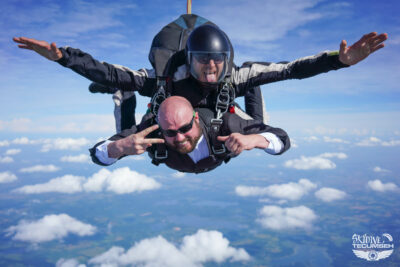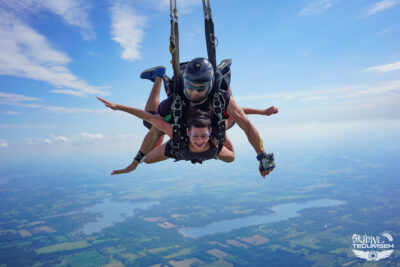- Michigan's Premier Skydiving Center
- Call Now: (517) 423-7720
Do You Get Motion Sickness While Skydiving?
Tuesday, August 27, 2024
- Skydive Tecumseh
- 8/27/24
- 0
- General
Skydiving is a bucket-list adventure that promises unmatched thrill combined with life-changing memories, but for some, the fear of getting motion sickness while on their jump can put a huge damper on the excitement. If you’ve ever wondered whether you’ll feel queasy mid-air or if your stomach will drop like it does on a roller coaster, you’re not alone!
Motion sickness while skydiving is pretty uncommon, but it can occur – particularly if you’re prone to it in other situations, like car rides and boat trips. There are two scenarios during your skydive where you may experience some motion sickness.
Motion Sickness While Skydiving
During the Skydiving Freefall
Some jumpers find the quick descent and intense sensations of freefall to be disorienting – leading to nausea – while most others do not experience motion sickness at all.
During the Parachute Ride
If there is any moment where you would feel any motion sickness at all during your skydive, it would be during the parachute ride back down to the ground. This is because the instructor must fly the parachute in a circular pattern to accurately land back at the dropzone.
Do You Get The Stomach Drop Feeling When Skydiving?
Many people worry about the “stomach drop” feeling associated with roller coasters when considering skydiving. Interestingly enough, this familiar sensation does not typically occur during a skydive. The reason is that the transition from the airplane to freefall is relatively smooth and your body adjusts quickly as you reach your terminal velocity – the constant speed that you reach when the wind resistance meets the downward force of gravity.
Each person’s terminal velocity is about 120 mph and is determined by mass, density, the projected area of the object (you), drag coefficient (wind), and the acceleration due to gravity. Because of this phenomenon, instead of the stomach-dropping feeling, most people describe freefall as floating or flying rather than plummeting. Wee!
How to Prevent Skydiving Motion Sickness
We’ve been in the skydiving biz for quite some time – since 1964 to be exact – so we know a thing or two about preventing motion sickness while skydiving! Here are some helpful tips and tricks to prevent upchucking while on your skydive.
Fuel Your Body For Flight
Contrary to popular belief, skipping a meal before your skydive will make you MORE prone to getting sick on your skydive. We hear it all of the time! But your body needs the fuel to handle the jolts of adrenaline, serotonin, and dopamine that are about to make their way through your body.
If you don’t have the proper fuel in your tank, your body is less likely to cooperate. You’ll feel exhausted and nauseated which could lead to vomiting directly on your instructor. Yuck! If you’re wondering what to eat before skydiving, try “lighter” foods that typically make you feel focused and energized, and avoid greasy foods that make you feel lethargic.
Drink Plenty of Water
In addition to not having food in your system, dehydration can also increase the likelihood of feeling nauseous. It’s essential to drink plenty of water before you jump. However, be sure to not overdo it right before you jump, as a full bladder could become pretty uncomfortable, too.
Come Prepared (And Sober!)
 Attempting to skydive drunk or hungover is the easiest way to feel sick and vomit on your skydive. We would hate for you to ruin your skydiving experience and waste your money, so it’s best to avoid consuming alcohol at least eight hours before your skydive. Trust us, you’ll want to experience your jump fully sober, so you can take it all in.
Attempting to skydive drunk or hungover is the easiest way to feel sick and vomit on your skydive. We would hate for you to ruin your skydiving experience and waste your money, so it’s best to avoid consuming alcohol at least eight hours before your skydive. Trust us, you’ll want to experience your jump fully sober, so you can take it all in.
If you’re wondering, should I take motion sickness pills before skydiving? We would leave that up to you and your doctor! As long as the medication doesn’t make you drowsy and your doctor approves, it might be a good idea to take motion sickness pills before your skydive to better prepare. If you’re concerned, consult a physician before going skydiving.
Eyes on the Horizon
Do your best to relax, take slow breaths in through your nose, out through your mouth, and focus your eyes on the horizon. If you’re feeling a little disoriented, keep your eyes on the beautiful, blue horizon out in front of you – this will help your brain register where you are in space and reduce the feeling of disorientation that can lead to nausea.
Communicate!
Always, ALWAYS, communicate with your instructor about how you are feeling. We want you to feel as comfortable as possible while on the greatest adventure of your life, so if you’re starting to feel sick, please let your instructor know so they can make adjustments to your jump. Especially during the parachute ride, if you are prone to motion sickness, let them know and they can fly the parachute in a way that minimizes the dizziness and reduces your risk of feeling sick.
Can Skydiving Cause Vertigo?
Although extremely rare, skydiving has the potential to cause vertigo for those who experience it on the regular. With that being said, we’ve had many individuals with vertigo experience skydiving with no issues. If you experience vertigo or have a history of inner ear problems, it is essential to consult with your doctor before your jump to get approval and to seek helpful tips on how to prevent a skydiving vertigo episode.
Ready to take the leap without feeling queasy? Skydiving is an adventure that we think everyone should experience at least once in their lifetime, and with these tips, you can minimize motion sickness and enjoy your moment to the fullest. Book your skydive with Skydive Tecumseh today and feel the thrill! Blue skies.

Wonderful staff -- my tandem instructor, James, was funny, clear, and made sure that I was comfortable during the entire experience (which involved two flights and a bit of "will-we-or-won't-we" due to clouds).
The dive itself is unreal -- exhilarating and meditative, terrifying and relaxing, absolutely breathtaking. I absolutely recommend you try it here first. Skydive Tecumseh has a great reputation, and there's a reason for that. I hope to go again.
John Maguire
Copyright © 2025, Skydive Tecumseh, All Rights Reserved.
DropZone Web Design & Marketing by Beyond Marketing, LLC
